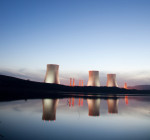What’s new in the 2013 Energy Efficiency Policies report?
The report observes that a growing number of countries are implementing consistent energy efficiency policies, enforcing new regulations and standards, and developing financial mechanisms for energy efficiency investments. Most energy regulations now represent around 70% of all measures. New actors are mobilised in the implementation of energy efficiency policies: energy services companies (ESCOs), banks, and utilities, too, are playing a stronger role in energy savings with their customers, and they are often doing this even without being required by government.
How do you see the report will help influence decision-makers?
The survey on energy efficiency policies implemented by governments around the world enables the sharing of experience accumulated over 20 years. Best practices are being spread in all regions: in 2006 only 40% of countries had quantitative targets on energy efficiency, but now there are more than 80% that have such targets. Labels and minimum efficiency standards have been implemented in most countries to increase the energy performance of buildings and electrical equipment such as refrigerators and air conditioning.
How is the report put together?
The second part of the report, on energy efficiency policies, is done through a large survey among the ADEME and WEC network involving WEC national committees and Enerdata. We are very satisfied that we have been able to cover 85 countries representing more than 95% of world energy consumption.
What has the experience been in working with the WEC ?
The cooperation between WEC and ADEME is unique as the network mobilised in this study is very large, both in term of geographical coverage (all emerging economies on board) and the actors: including businesses that are strongly involved in energy efficiency as well as energy suppliers. Working with the WEC is also important for the dissemination of results: the last report was downloaded by more than 38,000 experts in 2011 alone.
Dr François Moisan leads the WEC Knowledge Network on Energy Efficiency Policies. He is Executive Director of Strategy, Research & International Affairs and also Scientific Director of ADEME, the public agency in charge of implementing French policies on energy efficiency, renewable energy and environment.
The report, Energy Efficiency Policies, will be released on 11 September with a presentation at the Swiss Energy and Climate Summit.
Its database reflecting 2010 information can be viewed here: http://bit.ly/194AgtA







